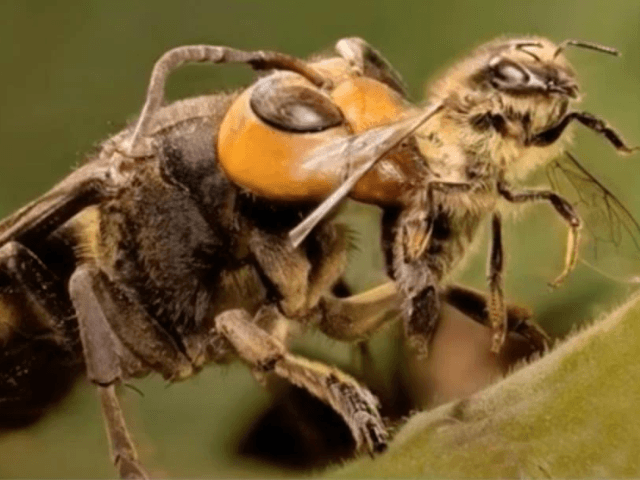Asia’s ‘murder hornets’ were spotted in the United States for the first time recently, causing scientists to worry that the insect might be colonizing.
“In Japan, the hornets kill up to 50 people a year. Now, for the first time, they have arrived in the United States,” the New York Times reported Saturday.
The article continued:
With queens that can grow to two inches long, Asian giant hornets can use mandibles shaped like spiked shark fins to wipe out a honeybee hive in a matter of hours, decapitating the bees and flying away with the thoraxes to feed their young. For larger targets, the hornet’s potent venom and stinger — long enough to puncture a beekeeping suit — make for an excruciating combination that victims have likened to hot metal driving into their skin.
The initial sightings occurred in Washington state in December, and scientists have since launched a full-scale hunt for the deadly pest over concerns it might “establish such a deep presence that all hope for eradication could be lost,” the Times noted.
During the winter, state agriculture biologists and local beekeepers joined forces and set up traps to find and kill the hornets.
“This is our window to keep it from establishing. If we can’t do it in the next couple of years, it probably can’t be done,” said Chris Looney, an entomologist at the Washington State Department of Agriculture.
Sunday, ABC 13 shared a photo of an Asian giant hornet on Twitter.
YIKES!!! 'Asian giant hornets' are an invasive and potentially deadly species and they've just been found in the U.S. for the first time. 😲https://t.co/GJLwBnkAMQ pic.twitter.com/4pYafbo4BS
— ABC 13 News – WSET (@ABC13News) May 3, 2020
An infestation of the hornets could be devastating for beekeepers who bring their hives to Washington state to pollinate Northwest Pacific crops such as cherries, blueberries, and apples, according to UPI.
“Commercial beekeepers have 300 to 400 hives in the area,” said Timothy Lawrence, director of the Island County extension office at Washington State University. “They may not want to go to certain counties if this infestation takes hold.”
Global economies and travel to and from distant places have caused invasive species to be more common, according to Todd Murray, a Washington State University extension entomologist.
“When we do get establishment of a new invasive species, its’ [sic] a ‘forever change,’ and becomes something we learn to live with,” he explained, adding, “This is definitely a hornet I don’t want to learn to live with.”

COMMENTS
Please let us know if you're having issues with commenting.